 2020’s been a funny old year for album releases. It’s difficult for artists to decide what to do with their new material; postpone and wait for the opportunity to tour in support of the album or take advantage of period when there are fewer albums to compete with. Or maybe after the album’s complete, there’s an urge to just get it out there. “Falling Away from Me” was released across the pond in February 2020 and presumably the intention was to release it here to coincide with a summer tour. And along came COVID. Whatever the reasoning, after a lengthy musical apprenticeship covering many different countries, Sandra Bouza has decided to release her first album, “Falling Away from Me” in October 2020.
2020’s been a funny old year for album releases. It’s difficult for artists to decide what to do with their new material; postpone and wait for the opportunity to tour in support of the album or take advantage of period when there are fewer albums to compete with. Or maybe after the album’s complete, there’s an urge to just get it out there. “Falling Away from Me” was released across the pond in February 2020 and presumably the intention was to release it here to coincide with a summer tour. And along came COVID. Whatever the reasoning, after a lengthy musical apprenticeship covering many different countries, Sandra Bouza has decided to release her first album, “Falling Away from Me” in October 2020.
It’s an album that proudly displays its creator’s influences throughout. There are elements of pop, jazz, blues and rock, but the foundation of the work is its tight funk rhythms created by the understated combination of guitar, bass and drums with occasional seasoning of keyboards, a sample or a piece of electronica. Without ever sounding derivative, the album hints instrumentally and vocally at a number of artists; more on that later. The individual stamp that defines the album, is the highly personal and confessional lyrics of the eight songs, dealing with bad choices in lifestyle and relationships. It’s an album of funky torch songs.
The mid-tempo jazz-blues of “Not Like Me” is a nod in the direction of Robert Cray’s “Right Next Door”, which features not only a powerful lead vocal, but some lovely layered and ethereal backing vocals as well, while “Stone Junction” is a bit more robust with a punchy bassline and some clipped Steve Cropper-like guitar backing up a tale of misplaced nostalgia for a corrosive past. “Human Connection” has some electronic percussion and a pumping bassline that wouldn’t sound out of place on a Pet Shop Boys song and the backing vocals towards the close are reminiscent of Clare Torry on “Great Gig in the Sky”.
The songs demonstrate Sandra’s vocal versatility across a range of dynamics; at times she has a hint of Chrissie Hynde, “Losing You” has the delicacy of Judie Tzuke and the highly personal closer “Wrong Songs” is a nod towards Sade; there’s even a touch of Ella’s scat singing towards the end.
The album is a strong collection of songs pulled together with an autobiographical thread that gives Sandra Bouza an opportunity to demonstrate her vocal and songwriting abilities and it certainly achieves that goal. When things get back to whatever the new normal is, I’ll be keen to see Sandra Bouza playing live in the UK.
“Falling Away from Me” is released in the UK on Friday October 30th on Sabucedo Records (SB003).
John Preston’s been writing for MusicRiot for a few years now, but this year he’s started to concentrate on his work for Vada online magazine and we genuinely wish him all the best with that venture. We’ve managed to lure him back for his take on the five best albums of the year. Give some of these a listen, because John really knows his stuff.
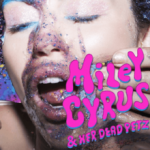 Miley Cyrus – “Miley Cyrus & Her Dead Petz”
Miley Cyrus – “Miley Cyrus & Her Dead Petz”
“Miley Cyrus & Her Dead Petz” is surprisingly sensitive and predominantly mid-tempo with even songs like “Bang My Box” and “Space Boots” being ladled with melancholia and not sounding as you might expect. In a year of Tidal exclusives versus ‘you will buy my album, I don’t care if you pay for streaming’, Miley Cyrus beyonced a brilliant album with minimal fuss for zero pence which anyone with an internet connection could listen to. She continues to piss the right people off and many won’t bother to listen. For someone who grew up with Madonna this is a familiar story and like the gnarly icon herself, Miley Cyrus is far from done.
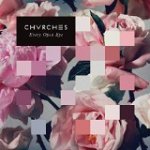 Chvrches – “Every Open Eye”
Chvrches – “Every Open Eye”
The Scottish trio have effectively made the third Yazoo album, the one that the eighties synth-duo never got around to finishing. Tight and upright melodies, shining and exhilarating electronics and with Lauren Mayberry’s regional accent punching out its many kiss-offs, “Leave a Trace” builds on what was promised on their 2013 debut and delivers a flawless start-to-finish album of perfect pop songs. Chvrches have perfected the art of making huge records that sound like the past and future colliding.
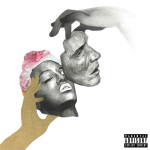 Dawn Richard – “Blackheart”
Dawn Richard – “Blackheart”
Released at the top of the year, the second in a trilogy of albums, “Blackheart” was an often a bleak but breathtakingly beautiful record about redemption. Ultimately uplifting, Dawn Richard manages to cover the old story of hope that’s lost and then found in a new way and within a flinty futuristic soundscape that refuses to conform to traditional R’n’B structures and timeframes. Visionary and fearless, Dawn Richard star continues to rise and rise.
 Lana Del Rey – “Honeymoon”
Lana Del Rey – “Honeymoon”
The oddest pop-star of them all, Lana Del Rey reduces her trademark lyrical tics and sound stylings down to a sticky and claustrophobic pitch-black potion consisting of, you got it, sex, drugs and unrequited love. “Honeymoon” is Del Rey’s most honest and hard-core artistic statement yet with only snatches of camp (“Salvatore” rhymes soft ice cream with limousines) to lift the funereal mood. No longer as needy and as accommodating as before, Lana Del Rey continues to baffle but ultimately proves she is in a league of her own, demanding to be taken seriously.
 Braids – “Deep In the Iris”
Braids – “Deep In the Iris”
“Miniskirt” is a brittle kick in the gut and Braids most focused and attention-grabbing song of their career. Their third album “Deep in the Iris” has a kitchen sink, melodrama quality and riffs on mid-nineties British synth pop bands like Dubstar and Pet Shop Boys pre-slump. Drum ‘n’ bass, euphoric electro-pop choruses and a theme of sexual identity dominate an album that is far lighter and easy to absorb than this might at first suggest; don’t let Braids pass you by.
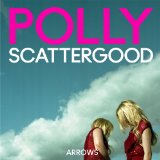 The phrase ‘an acquired taste’ could have been made for Polly Scattergood. She has a little girl lost voice and a tendency to cast herself as a needy victim to such an extent that the preference may be to send her to a good psychoanalyst than indulge in her recorded confessions. Her self-titled debut included a song called “I Hate The Way” in which Scattergood listed all of the things wrong with her and included the line ‘not all men are bad and I’m not like your dad and I’ll hold you even though you’re slightly mad’ sung from the perspective of her boyfriend. But she can have a way with a tune and her best tracks were perverse and genuinely dark, atmospheric electro pop songs. “Arrows” picks on up the synth-pop element of her first collection and broadens it with ballads as contrast; this is an album that is more slow than fast, are just as black-hearted and desperate.
The phrase ‘an acquired taste’ could have been made for Polly Scattergood. She has a little girl lost voice and a tendency to cast herself as a needy victim to such an extent that the preference may be to send her to a good psychoanalyst than indulge in her recorded confessions. Her self-titled debut included a song called “I Hate The Way” in which Scattergood listed all of the things wrong with her and included the line ‘not all men are bad and I’m not like your dad and I’ll hold you even though you’re slightly mad’ sung from the perspective of her boyfriend. But she can have a way with a tune and her best tracks were perverse and genuinely dark, atmospheric electro pop songs. “Arrows” picks on up the synth-pop element of her first collection and broadens it with ballads as contrast; this is an album that is more slow than fast, are just as black-hearted and desperate.
“Wanderlust” has a Numanesque overarching synth and sounds like Goldfrapp at their squelchiest. It’s nice but derivative and the silky “Disco Damaged Kid” is one of the many songs here that builds into something very different from its first couple of minutes but fails to live up to the vivid imagery suggested in its title. “Falling” has a rougher New Order indie pop sound and “Machines” is a standout, a tender electronic ballad which builds to a convincing enough passionate climax. “Subsequently Lost” is probably the pop standout, a PSB type production, tight with an ‘I’ve subsequently lost my mind luv, apparently I’m going nowhere’ chorus which very much sums up Scattergood’s opinion of herself.
The album’s final track “I’ve Got A Heart” is appropriately heart-breaking; piano and synth chords, beautifully spaced out moments and also the confessional ‘the doctor gave me pills to take, to stop me feeling quite so awake’ line accompanied by strings which help play out the tracks final two minutes. If you don’t like this track then it’s unlikely that Polly Scattergood will be for you. Alternatively the piano led ballad “Miss You” crams in all of her less sympathetic aspects, lyrically and also in respect to performance. It’s whimsical and self-pitying with juvenile lyrics referring to bedroom floors and chimneypot-lined skies.
“Arrows” is an album that sees Polly Scattergood lose some of the things that made her debut oddly compelling. She is clearly attracted to melancholy and that dark disco aesthetic that’s loved by many similar artists but here she is both more diluted and obvious than before. The thing that marked her out as being different, her own relentless self-involvement and a singing style which manages to be downtrodden and girly, are still here but the songs let her down more often than not. The surreal flourishes of songs like “Nitrogen Pink” and “The Bunny Club” from her debut have been replaced by more straightforward song writing and themes and where Scattergood was very good at narrating these kinds of escapist fantasies she is less effective with these kitchen sink type scenarios. There is a place in the electro pop world for Polly Scattergood I’m sure but she many have to go back to her initial influences and eccentricities to push her way back through the very crowded door.
 ‘Return to form’ can sometimes be a cruel phrase when applied to an artist usually following a long period when attempts at a experimenting and self -expression are regarded as not working; when it’s finally time to ‘give the people what they want’, especially when the artist in question is finally happy with their new found creative freedom. It’s also a phrase which may have been overused in association with the Pet Shop Boys over the last decade or two. I’m reluctant to use it here as initially “Electric”, their twelfth studio album, feels more like one of their semi-regular ‘Disco’ excursions rather than a new album proper. There are only nine tracks, two of which are instrumental, with almost every track being at least 5 minutes long; there are no slow songs, but there is a ballad. But it’s much more than that, these are all new compositions, not remixes, and bears closest resemblance to 1988’s ‘Introspective’ which was an exceptional collection of long, newly-written at the time, dance-orientated songs. “Electric” also contains some of the most PSB-‘type’ songs the duo have released in a very long time and with Stuart Price’s bombastic, detailed and instantly gratifying production this is an album that fans who may have drifted away in recent years will feel instantly and overwhelmingly connected with.
‘Return to form’ can sometimes be a cruel phrase when applied to an artist usually following a long period when attempts at a experimenting and self -expression are regarded as not working; when it’s finally time to ‘give the people what they want’, especially when the artist in question is finally happy with their new found creative freedom. It’s also a phrase which may have been overused in association with the Pet Shop Boys over the last decade or two. I’m reluctant to use it here as initially “Electric”, their twelfth studio album, feels more like one of their semi-regular ‘Disco’ excursions rather than a new album proper. There are only nine tracks, two of which are instrumental, with almost every track being at least 5 minutes long; there are no slow songs, but there is a ballad. But it’s much more than that, these are all new compositions, not remixes, and bears closest resemblance to 1988’s ‘Introspective’ which was an exceptional collection of long, newly-written at the time, dance-orientated songs. “Electric” also contains some of the most PSB-‘type’ songs the duo have released in a very long time and with Stuart Price’s bombastic, detailed and instantly gratifying production this is an album that fans who may have drifted away in recent years will feel instantly and overwhelmingly connected with.
“Axis” is an instrumental, extended intro, sounding very much like of a mid-eighties TV theme, something butch, as imagined by Bobby O and Harold Faltermeyer; it’s warm and full sounding and is where the album title comes from. “Bolshy” follows, with its emphasis on the Russian Bolshevik rather than general stroppiness, and is the track which really launches the album with its house piano, familiar melody patterns and sarcastic attitude. Midpoint the vocal track sticks on the ‘O’ of Bolshio and a familiar cowbell sticks to the beat and acid house squiggles start to spiral out and take over. “Love Is a Bourgeois Construct” could have been a worry with the album peaking too early, an unwarranted concern as it turns out. With a filtered intro very much like Madonna’s “Hung Up”, also produced by Price, strings saw before a twee, archetypal British sample floats around, and then thump, we’re off. Like the best tracks on “Electric”, “Bourgeois” has a twin with an earlier PSB classic and in this case it’s the mighty “Left To My Own Devices”; if it doesn’t quite match the level of brilliance of that track then it comes pretty close. ‘I’m exploring the outer limits of boredom, moaning periodically, just a full time lonely layabout, that’s me’ is Neil Tennant’s admission as, in a heightened version of himself, he manages to refer to Tony Benn, Karl Marx and uses the word schadenfreude all in the same song. A male choir crashes in a la “Go West” and it’s this one track that both grounds and dictates the overall sound and scale of “Electric”.
“Fluorescent”, one of the best tracks, is moodier; minor in key with an ascending synth melody that constantly threatens to turn into “Fade to Grey” and containing some of the best lyrics on an album packed with them (‘I can’t deny you’ve made your mark with the helicopters and the occasional oligarch…every scandal has its price’) with one of the PSB favourite themes of international glamour and clandestine lives led at night continuing after they were first introduced on the couple’s debut album from 1985, ‘‘Please’. “Electric”’s non- ballad, ballad is the thumping, squally “Last to Die”, a cover version of a Bruce Springsteen song which I’ve never heard before but here sounds very much like a Pet Shop Boys original; pompous, sad, sincere and just a very good pop song.
Aside from “Bourgeois”, the two very big hitters are saved until last. “Thursday” is essentially “West End Girls”, sonically definitely, with Chris Lowe’s monotone chant of ‘Thursday, Friday, Saturday, Sunday’ leading into a brilliantly realised, working class, blokey rap and middle eight by Example. Listen to the way he pronounces ‘memories’ for example (excuse pun); it was always about the details. “Vocal” is the most euphoric and obvious track on “Electric” and plays to many of the clichés of the current EDM craze with its big, cheesy, rave hook which is straight from 1999, see in particular Felix’s massive anthem “Don’t You Want Me”. But it’s the combination of the audaciousness of this sound coupled with the themes of nostalgia and narcissism (‘I like the lead singer, he’s lonely and strange….It’s in the music, it’s in the song, and everyone I hoped would be here has come along’) and also the subject of music itself that makes it such a success; it’s moving and it has history. The Pet Shop Boys have been making records like this for nearly 30 years; you can jump up and down to it and it will leave its mark somewhere deep.
So in 2013 the Pet Shop Boys sound an awful lot like they did whilst they were at their peak in 1988 and it appears as though it’s very much business as usual after it was strongly hinted that the business could finally be about to close down completely (last year’s “Elysium”). You could argue, and many will claim, that it’s the inevitable “return to form” then, but the PSBs form should not really be called in to account. All of their releases have merit, just in varying degrees, and their decision to do this seems a natural one; the whiff of cynicism is not detectable. In Stuart Price, Lowe and Tennant have found a producer who sounds like the lost third member and on “Electric” he has delivered his most on-the money, consistent production to date on some of the most accessible and immediate songs the duo have written in years. Whether or not it buys new fans, younger fans, is debatable and will remain to be seen but there are enough people who will rightly adore this sparking, intelligent and brilliant pop record and it does feel as though this album was made especially for them.
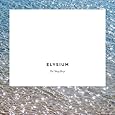 I think it’s safe to say that the last essential album that the Pet Shop Boys released was probably their best. “Very” was released in 1993, that’s nearly 20 years ago, and just for top-notch, quality songwriting alone (one of the many factors that made this such a perfect and revered collection of pop songs) nothing they’ve released since has come close to matching this, their masterpiece, or the 4 albums that preceded it. Pet Shop Boys are, after all, a pop act and pop acts by their very nature have a sell by date; pop culture is predominately dictated by youth culture and youth is all too fleeting. So what do the Pet Shop Boys sound like in 2012? Pretty much the same as they have done anywhere in the last decade; nice but far from necessary.
I think it’s safe to say that the last essential album that the Pet Shop Boys released was probably their best. “Very” was released in 1993, that’s nearly 20 years ago, and just for top-notch, quality songwriting alone (one of the many factors that made this such a perfect and revered collection of pop songs) nothing they’ve released since has come close to matching this, their masterpiece, or the 4 albums that preceded it. Pet Shop Boys are, after all, a pop act and pop acts by their very nature have a sell by date; pop culture is predominately dictated by youth culture and youth is all too fleeting. So what do the Pet Shop Boys sound like in 2012? Pretty much the same as they have done anywhere in the last decade; nice but far from necessary.
2009’s ‘Yes‘ was produced by Xenomania (Girls Aloud, Kylie, Cher) and magic was not created in the way that you may have hoped for from what should have been a pretty much dream collaboration. It was streamlined, safe and, bar a few highlights, dull. This time LA resident and R’n’B and hip hop producer (Kanye West, Jay Z), Andrew Dawson is on production duties – how does that sound for an interesting meeting of musical minds? Well, just don’t expect the unexpected. The best and most surprising thing about this collaboration is that Dawson, on the more successful tracks, has made the Pet Shop Boys sound like, well, the Pet Shop Boys. So much so that in some places it’s shocking. “A Face Like That” incorporates cowbells, synth lines, electronic hand-claps; all deployed to incredibly similar effect in 1986’s “Paninaro” (known to millions in its remixed form as the theme to the iconic 1990’s TV show, the Clothes Show). It’s unnerving and initially provides a huge adrenaline rush, even Neil’s vocals sound unchanged from over 20 years ago. Problem is the song itself is ok but nothing more and once you’ve got past the initial bombast it ultimately has the effect of you desperately needing to hear the brilliance of the original that it oddly mimics. It’s going backwards not forward. Without a doubt the album this most resembles though is 1996’s “Bilingual” which sonically encompassed Balearic beats, sunny sad handbag house and musical theatre (later versions of the album included a straight forward, high energy cover of “Somewhere” from “West Side Story”). It was uneven and was the sound of the Pet Shop Boys losing their bite for the very first time in a decade and the same themes are covered here.
“Your Early Stuff” and “Ego Music” are funny, self referencing and ironic; the absolute essence of the Pet Shop Boys. “Ego Music” could have been brilliant but is undermined by a predictable, bleeping electronic soundtrack when it should have been manic and crazed much like “Yesterday When I Was Mad” from “Very” which it resembles, or tries to at least. “Leaving” is a crisp, multi-layered mid-tempo track with a nostalgic instrumental break referencing Nu Shooz’s 1985 hit “I Can’t Wait” and is lovely and affecting as is the ode to the fifties gay man, ballad “Invisible”. “Winner” however, a disastrous decision for first single, is an attempt at lighters aloft power pop and is best regarded as conceptual. “Hold On” sounds like it was written for an assembly of six year olds singing about global warming, bizarre but pointless, and the muzzy, bland “Give It A Go” could be a cheesy theme tune written for corporate away day team building event.
The best song on “Elysium” however, where everything finally comes together, is the steely grey “Everything Means Something” all minor chords in the verses and major in the chorus and a dubby reverb on Neil’s vocal creating an unsettling effect. It’s interesting, diverting and brilliant and is very Pet Shop Boys (excuse the pun), and by that I mean what the Pet Shop Boys were once and judging by this one song could still be today, maybe. However, on the majority of the songs in this collection, Neil and Chris sound like they are going through the motions; the ideas may be there still but the realisation is not.


